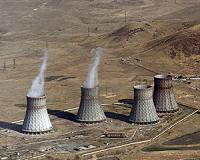 |
Paris (AFP) Sept 20, 2010 A former security director for French nuclear group Areva on Monday slammed the Niger military's "shortcomings" after the abduction of seven hostages in the west African desert state. "We have at the very least an enormous shortcoming. They did their job badly," said Gilles Denamur, a French ex-military officer who oversaw security at the firm's uranium mines in northern Niger until 2007. The hostages -- five French nationals, a Togolese and a Madagascan -- were kidnapped Thursday from their homes in Arlit in northern Niger by suspected Al-Qaeda-linked gunmen. Denamur told AFP he thought it unlikely that local security guards were behind the kidnappings, but said he believed it possible that some "eyes might have been closed on the part of the state security forces." He said his sources told him the kidnappers had been in the town for up to three days before the abductions and that he was "astonished" that government security forces had not detected their presence. "In Arlit, as soon as someone new arrives, everybody knows it," said Denamur, who was a French military attache in Niger before running security at the mines for a month and a half in 2007. He also noted that the abductions took place in the middle of the night in a town where "you don't drive at night-time." The retired colonel was deported from the country in 2007 because the government suspected him of colluding with Tuareg rebels. A source close to the case told AFP that Areva's facilities were out in the middle of the desert and "a choice target" for Al-Qaeda in the Islamic Maghreb (AQMI), which France suspects may be linked to the kidnappings. Areva on Monday denied refusing help from the Niger government to protect its workers in the west African state, but admitted it had made security mistakes. An Areva employee and his wife were among the seven people kidnapped. "There were without doubt... failings, things which did not work," said company spokesman Jacques-Emmanuel Saulnier. But he denied the firm had refused an offer by Niger's government to have troops protect its workers. The denial came after the Niger government said the firm had rejected its offer of troops to protect its workers at uranium fields and had instead chosen to use unarmed private security guards. Areva said that the security of its employees was the responsibility of the Niger forces, following an agreement the company signed in 2008 with Niamey. A local private security guard working for Areva told France Inter radio Monday that seven men carrying Kalashnikovs had burst into his compound and demanded to know where the "white people" were. They then took him to the house of Areva worker Daniel Larribe and his wife Francoise, where they burst in and abducted the couple, he said. The seven hostages all worked for French companies involved in uranium mining in the Arlit region. After initially announcing tighter security at its site in Arlit, both Areva and fellow French company Vinci decided to repatriate their foreign workers.
Share This Article With Planet Earth
Related Links Nuclear Power News - Nuclear Science, Nuclear Technology Powering The World in the 21st Century at Energy-Daily.com
 MIT study upbeat on nuclear power growth
MIT study upbeat on nuclear power growthWashington (UPI) Sep 17, 2010 Nuclear power use is growing worldwide but the high costs of setting up plants, disposing of waste and worries over abuse are holding back expansion, a new study by the Massachusetts Institute of Technology said. "To enable an expansion of nuclear power, it must overcome critical challenges in cost, waste disposal and proliferation concerns while maintaining its currently excellent saf ... read more |
|
| The content herein, unless otherwise known to be public domain, are Copyright 1995-2010 - SpaceDaily. AFP and UPI Wire Stories are copyright Agence France-Presse and United Press International. ESA Portal Reports are copyright European Space Agency. All NASA sourced material is public domain. Additional copyrights may apply in whole or part to other bona fide parties. Advertising does not imply endorsement,agreement or approval of any opinions, statements or information provided by SpaceDaily on any Web page published or hosted by SpaceDaily. Privacy Statement |